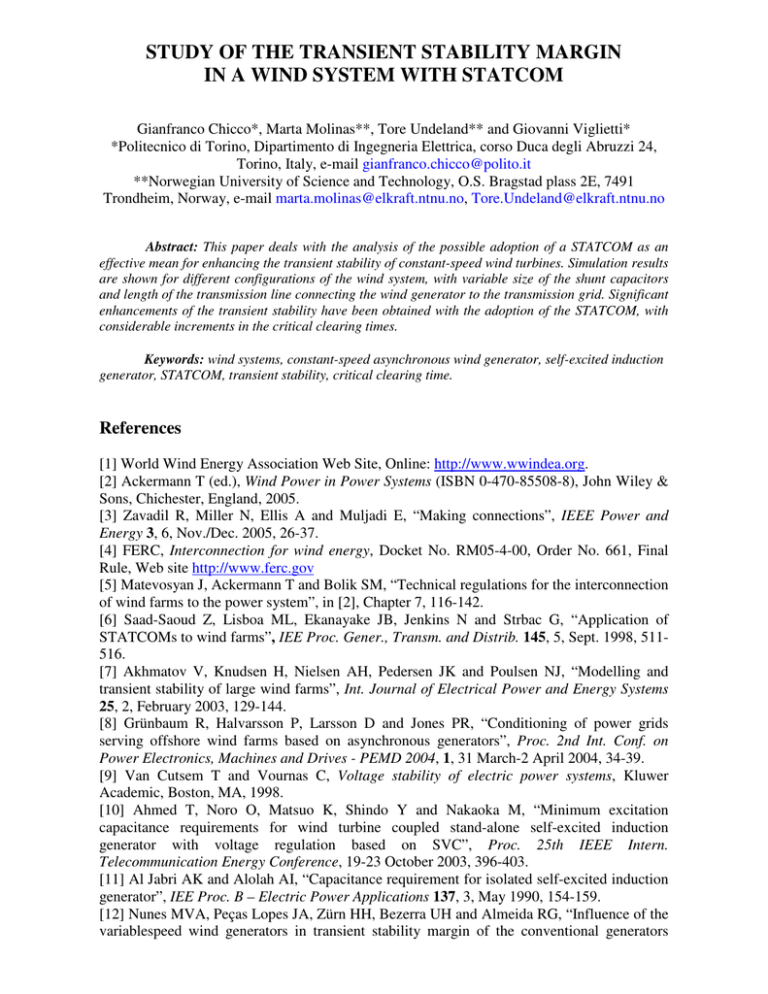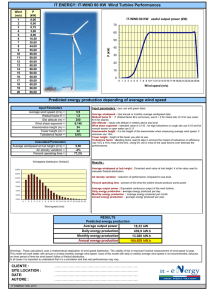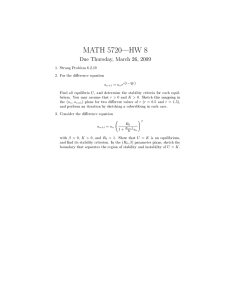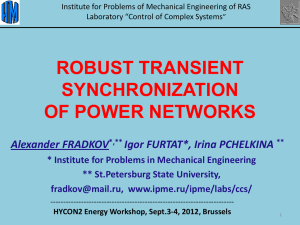study of the transient stability margin in a wind system with statcom
advertisement

STUDY OF THE TRANSIENT STABILITY MARGIN IN A WIND SYSTEM WITH STATCOM Gianfranco Chicco*, Marta Molinas**, Tore Undeland** and Giovanni Viglietti* *Politecnico di Torino, Dipartimento di Ingegneria Elettrica, corso Duca degli Abruzzi 24, Torino, Italy, e-mail gianfranco.chicco@polito.it **Norwegian University of Science and Technology, O.S. Bragstad plass 2E, 7491 Trondheim, Norway, e-mail marta.molinas@elkraft.ntnu.no, Tore.Undeland@elkraft.ntnu.no Abstract: This paper deals with the analysis of the possible adoption of a STATCOM as an effective mean for enhancing the transient stability of constant-speed wind turbines. Simulation results are shown for different configurations of the wind system, with variable size of the shunt capacitors and length of the transmission line connecting the wind generator to the transmission grid. Significant enhancements of the transient stability have been obtained with the adoption of the STATCOM, with considerable increments in the critical clearing times. Keywords: wind systems, constant-speed asynchronous wind generator, self-excited induction generator, STATCOM, transient stability, critical clearing time. References [1] World Wind Energy Association Web Site, Online: http://www.wwindea.org. [2] Ackermann T (ed.), Wind Power in Power Systems (ISBN 0-470-85508-8), John Wiley & Sons, Chichester, England, 2005. [3] Zavadil R, Miller N, Ellis A and Muljadi E, “Making connections”, IEEE Power and Energy 3, 6, Nov./Dec. 2005, 26-37. [4] FERC, Interconnection for wind energy, Docket No. RM05-4-00, Order No. 661, Final Rule, Web site http://www.ferc.gov [5] Matevosyan J, Ackermann T and Bolik SM, “Technical regulations for the interconnection of wind farms to the power system”, in [2], Chapter 7, 116-142. [6] Saad-Saoud Z, Lisboa ML, Ekanayake JB, Jenkins N and Strbac G, “Application of STATCOMs to wind farms”, IEE Proc. Gener., Transm. and Distrib. 145, 5, Sept. 1998, 511516. [7] Akhmatov V, Knudsen H, Nielsen AH, Pedersen JK and Poulsen NJ, “Modelling and transient stability of large wind farms”, Int. Journal of Electrical Power and Energy Systems 25, 2, February 2003, 129-144. [8] Grünbaum R, Halvarsson P, Larsson D and Jones PR, “Conditioning of power grids serving offshore wind farms based on asynchronous generators”, Proc. 2nd Int. Conf. on Power Electronics, Machines and Drives - PEMD 2004, 1, 31 March-2 April 2004, 34-39. [9] Van Cutsem T and Vournas C, Voltage stability of electric power systems, Kluwer Academic, Boston, MA, 1998. [10] Ahmed T, Noro O, Matsuo K, Shindo Y and Nakaoka M, “Minimum excitation capacitance requirements for wind turbine coupled stand-alone self-excited induction generator with voltage regulation based on SVC”, Proc. 25th IEEE Intern. Telecommunication Energy Conference, 19-23 October 2003, 396-403. [11] Al Jabri AK and Alolah AI, “Capacitance requirement for isolated self-excited induction generator”, IEE Proc. B – Electric Power Applications 137, 3, May 1990, 154-159. [12] Nunes MVA, Peças Lopes JA, Zürn HH, Bezerra UH and Almeida RG, “Influence of the variablespeed wind generators in transient stability margin of the conventional generators integrated in electrical grids”, IEEE Trans. on Energy Conversion 19, 4, December 2004, 692-701. [13] Holdsworth L, Wu XG, Ekanayake JB and Jenkins N, “Comparison of fixed speed and doubly-fed induction wind turbines during power system disturbances”, IEE Proc. Gener., Transm. and Distrib. 150, 3, May 2003, 343-350. [14] Marei MI, El-Fouly THM, El-Saadany EF and Salama MMA, “A flexible wind energy scheme for voltage compensation and flicker mitigation”, Proc. IEEE/PES General Meeting 2003, 4, 13-17 July 2003. [15] Ahmed T, Nishida K and Nakaoka M, “Static VAR compensator-based voltage regulation implementation of single-phase self-excited induction generator”, Proc.39th IEEE Industry Application Society Annual Meeting 2004, 3, 3-7 October 2004, 2069-2076. [16] Sun T, Chen Z and Blaabjerg F, “Flicker mitigation of grid connected wind turbines using STATCOM”, Proc. 2nd Int. Conf. on Power Electronics, Machines and Drives - PEMD 2004, 1, 31 March-2 April 2004, 175-180. [17] Trudnowski DJ, Gentile A, Khan JM and Petritz EM, “Fixed-speed wind-generator and wind-park modeling for transient stability studies”, IEEE Trans. on Power Systems 19, 4, November 2004, 1911-1917. [18] Molinas M, Nass B, Gullwik W and Undeland T, “Control of wind turbines with induction generators interfaced to the grid with power electronics converters”, Proc. Int. Power Electronics Conference IPEC 05, Niigata, Japan. [19] Molinas M, Vazquez S, Takaku T, Carrasco JM, Shimada R and Undeland T, “Improvement of transient stability margin in power systems with integrated wind generation using a STATCOM: an experimental verification”, Proc. FPS 2005, Amsterdam, The Netherlands, 16-18 November 2005. [20] Kundur P, Power System Stability and Control, McGraw-Hill, New York, 1994. [21] Eriksen PB, Ackermann T, Abildgaard H, Smith P, Winter W and Rodríguez García J, “System operation with high wind penetration”, IEEE Power and Energy 3, 6, Nov./Dec. 2005, 65-74.


